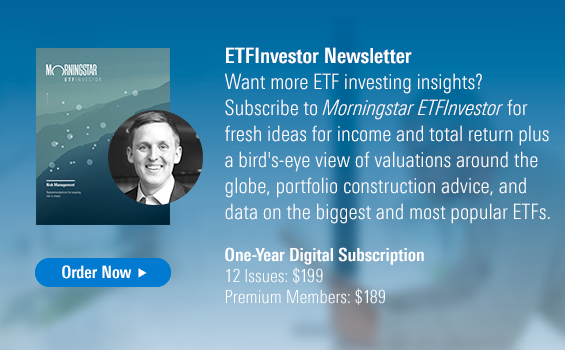A Dividend ETF That’s Giving Our Longtime Favorites a Run for Their Money
There's a lot to like about this fund—save for its relatively steep price.
A version of this article was published in the June 2016 issue of Morningstar ETFInvestor. Download a complimentary copy of Morningstar ETFInvestor by visiting the website.
Since its October 2013 launch,
The performance of the fund’s benchmark, the S&P 500 Dividend Aristocrats Index, has been equally impressive over longer stretches. During the 10-year period ended May 31, 2016, the index returned 10.6% on an annualized basis versus a 7.5% annualized return for VIG’s bogy (the Nasdaq U.S. Dividend Achievers Select Index) and 10.1% for the benchmark behind SCHD (the Dow Jones U.S. Dividend 100 Index). It is high time we take a closer look at NOBL and size it up against the incumbents.
The S&P 500 Dividend Aristocrats Index is an exclusive club. The index screens the S&P 500 for those firms that have increased their annual dividends for at least 25 years running—no mean feat. In an effort to maintain adequate diversification, the index must have at least 40 constituents and no sector can represent more than 30% of its value. To meet these requirements, the index rules will bend a bit to allow for the inclusion of stocks that have increased annual dividends for just 20 years, uninterrupted. The index equally weights its constituents and reweights them to equal weight on a quarterly basis.
The index’s dividend screen yields a portfolio of high-quality stocks—not unlike VIG and SCHD. Equal-weighting its constituents introduces a smaller-cap tilt. As of the end of May, the average market cap of stocks in NOBL’s portfolio was $38.3 billion. The comparable figures for SCHD and VIG were $95.3 billion and $47.2 billion, respectively. The quarterly reweighting feature will add a bit of value into the mix (by way of regularly upping allocations to stocks that have performed relatively poorly) and may throttle momentum (paring back allocations to names that have performed relatively well). All told, there is a lot to like about this index.
I have one major beef with NOBL as it exists today: its relatively steep price tag. The fund charges an annual expense ratio of 0.35%, exactly equal to the average (and median) fee levied by its most relevant peer group, which for purposes of my analysis I’ve defined as ETPs fitting into the large-value, -blend, and -growth Morningstar Categories that also fall into the dividend screened/weighted bucket of our strategic-beta taxonomy (this group includes 19 ETPs with more than $60 billion in collective assets under management). That said, its fee is a multiple of those levied by SCHD (0.07%) and VIG (0.09%). That amounts to a head start of 0.26%-0.28% per year for NOBL’s chief rivals.
While I like the makeup of NOBL’s bogy, and it has a strong track record, I don’t think the price is quite right. Though a relatively rich fee can be addressed, for the time being I prefer SCHD and VIG over NOBL.

Disclosure: Morningstar, Inc.'s Investment Management division licenses indexes to financial institutions as the tracking indexes for investable products, such as exchange-traded funds, sponsored by the financial institution. The license fee for such use is paid by the sponsoring financial institution based mainly on the total assets of the investable product. Please click here for a list of investable products that track or have tracked a Morningstar index. Neither Morningstar, Inc. nor its investment management division markets, sells, or makes any representations regarding the advisability of investing in any investable product that tracks a Morningstar index.

/s3.amazonaws.com/arc-authors/morningstar/a90ba90e-1da2-48a4-98bf-a476620dbff0.jpg)
/cloudfront-us-east-1.images.arcpublishing.com/morningstar/T2LGZCEHBZBJJPPKHO7Y4EEKSM.png)
/d10o6nnig0wrdw.cloudfront.net/04-18-2024/t_34ccafe52c7c46979f1073e515ef92d4_name_file_960x540_1600_v4_.jpg)
/d10o6nnig0wrdw.cloudfront.net/04-09-2024/t_e87d9a06e6904d6f97765a0784117913_name_file_960x540_1600_v4_.jpg)
:quality(80)/s3.amazonaws.com/arc-authors/morningstar/a90ba90e-1da2-48a4-98bf-a476620dbff0.jpg)